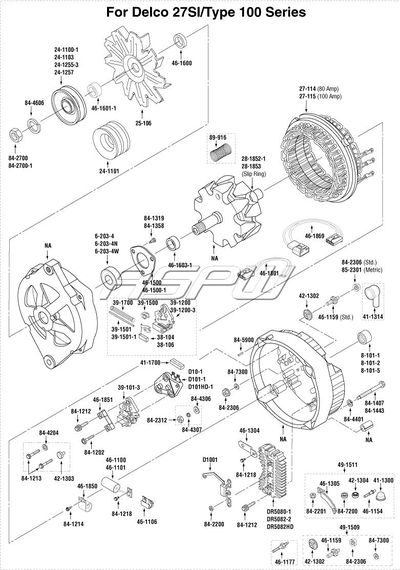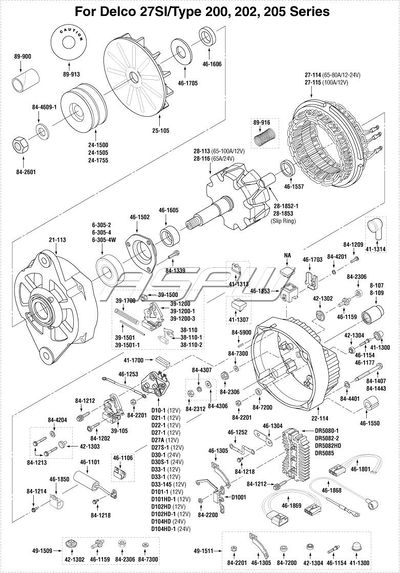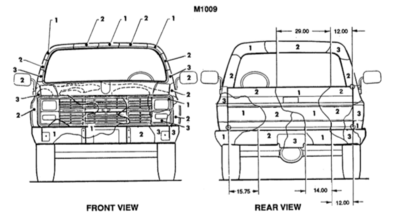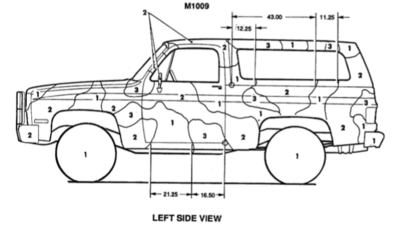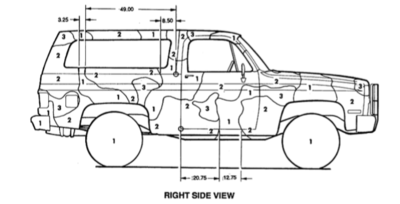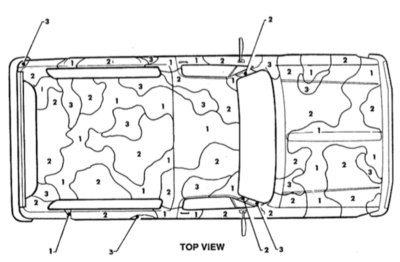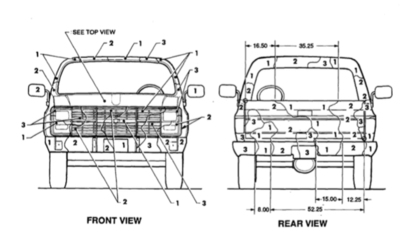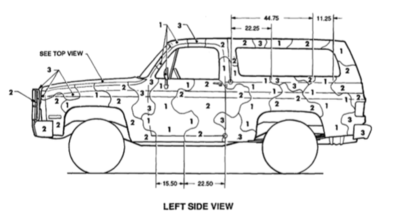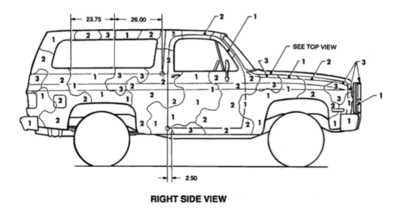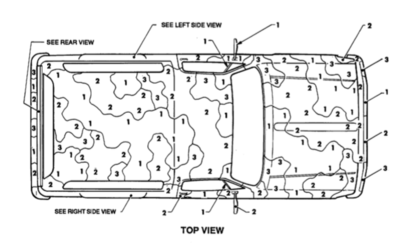Difference between revisions of "CUCV"
RadioNerds (talk | contribs) |
RadioNerds (talk | contribs) |
||
| (10 intermediate revisions by the same user not shown) | |||
| Line 27: | Line 27: | ||
|I||1988 | |I||1988 | ||
|} | |} | ||
| + | |||
| Line 156: | Line 157: | ||
:ENGINE, DIESEL: 8 CYLINDER, TURBOCHARGED, FUEL-INJECTED, WATER COOLED | :ENGINE, DIESEL: 8 CYLINDER, TURBOCHARGED, FUEL-INJECTED, WATER COOLED | ||
:January 1996 | :January 1996 | ||
| + | |||
| + | |||
| + | ;{{pdf|TM_9-2815-237-34P.pdf|TM_9-2815-237-34P}} | ||
| + | :DIRECT SUPPORT AND GENERAL SUPPORT MAINTENANCE REPAIR PARTS AND SPECIAL TOOLS LIST | ||
| + | ::ENGINE, DIESEL: 8 CYLINDER, NATURALLY ASPIRATED, FUEL-INJECTED, WATER COOLED, | ||
| + | :::DDA MODEL 6.2 LITER (SERIAL NUMBER 1-99,999) | ||
| + | ::::(SERIAL NUMBER 100,000 AND ABOVE) (1990); | ||
| + | :::DDA MODEL 6.5 LITER | ||
| + | ::::(NSN 2815-01-410-9710) (1995), | ||
| + | ::::(NSN 2815-01-410-9710) (1996), | ||
| + | ::::(NSN 2815-01-439-6665) (1997), | ||
| + | ::::(NSN 2815-01-453-7403) (1998), | ||
| + | ::::(NSN 2815-01-461-7078) (1999), | ||
| + | ::::(NSN 2815-01-461-7078) (2000), | ||
| + | ::::(NSN 2815-01-461-7078) (2001); | ||
| + | ::ENGINE, DIESEL: 8 CYLINDER, NATURALLY ASPIRATED, DETUNED, FUEL-INJECTED, WATER COOLED, | ||
| + | :::DDA MODEL 6.5 LITER | ||
| + | ::::(NSN 2815-01-406-6675) (1996), | ||
| + | ::::(NSN 2815-01-439-6664) (1997), | ||
| + | ::::(NSN 2815-01-453-7404) (1998), | ||
| + | ::::(NSN 2815-01-472-6312) (1999), | ||
| + | ::::(NSN 2815-01-439-6664) (2000), | ||
| + | ::::(NSN 2815-01-439-6664) (2001); | ||
| + | ::ENGINE, DIESEL: 8 CYLINDER, TURBOCHARGED, FUEL-INJECTED, WATER COOLED, | ||
| + | :::(NSN 2815-01-420-4180) (1996), | ||
| + | :::(NSN 2815-01-439-8164) (1997), | ||
| + | :::(NSN 2815-01-453-7402) (1998), | ||
| + | :::(NSN 2815-01-439-8164) (1999), | ||
| + | :::(NSN 2815-01-439-8164) (2000), | ||
| + | :::(NSN 2815-01-439-8164) (2001). | ||
| + | ::23 April 2003 | ||
| Line 164: | Line 196: | ||
| − | ;{{pdf|stanadyne_db2_operation_and_instructions_manuals.pdf|Stanadyne | + | ;{{pdf|stanadyne_db2_operation_and_instructions_manuals.pdf|Stanadyne DB2 Operation and Instruction Manual}} |
| + | |||
| + | |||
| + | ;{{pdf|stanadyne_db2_troubleshooting_guide.pdf|Stanadyne DB2 Troubleshooting Guide}} | ||
| + | |||
| + | |||
| + | |||
===Paint and Markings=== | ===Paint and Markings=== | ||
| Line 196: | Line 234: | ||
:General Motors Corporation | :General Motors Corporation | ||
::1982 (Revision 1/83) | ::1982 (Revision 1/83) | ||
| + | |||
| Line 226: | Line 265: | ||
==Relays, Switches and Diodes== | ==Relays, Switches and Diodes== | ||
| − | + | <p style="font-size:1em;padding:5px;">All Images in this Section © 2014 [http://www.steelsoldiers.com Steel Soldiers], Used with Permission</p> | |
| − | + | <gallery widths=100px heights=100px perrow=5> | |
| + | File:SS_Blackout_relay.jpg|Blackout Light Relay | ||
| + | File:SS_headlight_BO_switches.jpg|Headlight Switch / Blackout Switch | ||
| + | File:SS_diagnostic_resistor_board.jpg|Diagnostic Relay Board | ||
| + | File:SS_Diagnostic_tach_buffer.jpg|Diagnostic Tach Buffer | ||
| + | File:SS_Dimmer_switch.jpg|Dimmer Switch | ||
| + | File:SS_downshift_switch.jpg|Downshift Switch | ||
| + | File:SS_flasher_diode.jpg|Flasher Diode | ||
| + | File:SS_flasher_diode_2.jpg|Flasher Diode #2 | ||
| + | File:SS_Generator_2_diode.jpg|Generator #2 Diode | ||
| + | File:SS_Glowplug_Controller.jpg|Glowplug Controller | ||
| + | File:SS_horn_seatbelt_coolant.jpg|Horn Seatbelt Coolant Modules | ||
| + | File:SS_horn_diode.jpg|Horn Diode | ||
| + | File:SS_horn_relay.jpg|Horn Relay | ||
| + | File:SS_ignition_switch.jpg|Ignition Switch | ||
| + | File:SS_stoplight_switch.jpg|Stoplight Switch | ||
| + | File:SS_water_in_fuel_diode.jpg|Water In Fuel Diode | ||
| + | File:SS_Relays_with_doghead_modification.jpg|New Relays with "DogHead" Modification | ||
| + | </gallery> | ||
| + | |||
| + | ==Alternator== | ||
| − | + | [[File:DR-27SI-100.jpg|400px]] | |
| − | |||
| − | |||
| + | [[File:DR-27SI-200.jpg|400px]] | ||
| − | |||
| − | |||
| + | ==Painting Specifications and Designs== | ||
| + | All military vehicles and equipment have characteristic shapes and shadows. These shapes and shadows contrast with the material surroundings and make the object stand out. Pattern painting using wavy, irregular patches of camouflage colors does much to break up the characteristic shapes of the equipment by reducing contrasts with sod and vegetation, pattern shape, and placement. Patterns have been designed for each type of vehicle to cut off sharp corners, avoid straight, vertical, and horizontal lines, and extend shadows in shapes similar to natural features and vegetation; however, the accuracy with which the CPP is applied completely determines how well the CPP camouflages the equipment. | ||
| − | |||
| + | Pattern painting is not a magic, cure-all camouflage technique, but it makes the item much harder to see and recognize as a military object. It also provides an excellent base for applying further natural camouflage such as tree limbs, shrubs and grass. | ||
| − | |||
| + | The theory behind pattern design is to provide a camouflage system for equipment that is universal and can he adapted to various geographical, seasonal, and terrain changes by the changing of one or possibly two colors. For instance, temperate zone colors of green, brown and black may be changed to desert colors by changing green to tan. | ||
| − | + | NOTE: CARC colors should not be mixed with one another as this will alter their individual effectiveness when applied to the end item. Blending is not permitted. | |
| − | + | These resigns also lend themselves to touchup painting with better results than are now obtainable from touchup of the current olive-drab vehicles. Slight mismatches in color are expected at times and will not be noticeable except upon close inspection. Likewise, minor abrasions and scaling of surfaces will be equally inconspicuous. Marring and surface lightening due to handling is characteristic of camouflage coatings and does not impede camouflage or infrared properties. This is typical of low gloss and sheen coatings in dark colors and is considered satisfactory. | |
| − | + | ===Painting Specifications=== | |
| + | *ALL DIMENSIONS ARE IN INCHES. | ||
| + | *O DENOTES A LOCATION ON THE ITEM THAT IS USED AS A REFERENCE POINT. THE DISTANCE FROM THIS REFERENCE POINT TO THE EDGE OF THE BLACK BAND IS THE LOCATING DIMENSION. TOLERANCE ON THIS DIMENSION IS + 1.00 INCH. | ||
| + | *THE HORIZONTAL DISTANCE ACROSS A BLACK BAND IS THE BAND WIDTH. IF THIS DIMENSION IS SHOWN THE TOLERANCE IS + 1.00 INCH. | ||
| + | *Δ LOCATES A PHYSICAL FEATURE THAT THE PATTERN CONTOUR INTERSECTS WITHIN + 1.00 INCH. NO LOCATING DIMENSION IS REQUIRED. | ||
| + | *INSPECTION OF THE CAMOUFLAGE PATTERN WILL CONSIST OF CHECKING ALL LOCATING DIMENSIONS AND BAND WIDTHS SHOWN ON INSPECTION SHEET AS A MINIMUM. ALTERNATE OR ADDITIONAL REFERENCE POINTS, LOCATING DIMENSIONS AND BAND WIDTHS MAY BE INCLUDED IN THE INSPECTION. DIMENSIONS WILL BE DEVELOPED BY SCALING FROM PATTERN DRAWINGS. DO NOT USE INSPECTION SHEET TO DEVELOP DIMENSIONS. THE TOLERANCE FOR ALL DEVELOPED DIMENSIONS WILL BE + 1.00 INCH. | ||
| − | + | ;1) Black | |
| + | ;2) Green | ||
| + | ;3) Brown | ||
| − | |||
| + | ===Standard Pattern When Retrofitted=== | ||
| + | [[File:M1009_Front_Rear_View.png|400px]] | ||
| − | |||
| + | [[File:M1009_Left_Side_View.png|400px]] | ||
| − | |||
| + | [[File:M1009_Right_Side_View.png|400px]] | ||
| − | |||
| + | [[File:M1009_Top_View.png|400px]] | ||
| − | |||
| − | + | ===Complete Repaint Patterns=== | |
| + | [[File:M1009_Front_Rear_View_Repaint.png|400px]] | ||
| − | {{ | + | [[File:M1009_Left_Side_View_Repaint.png|400px]] |
| + | |||
| + | |||
| + | [[File:M1009_Right_Side_View_Repaint.png|400px]] | ||
| + | |||
| + | |||
| + | [[File:M1009_Top_View_Repaint.png|400px]] | ||
| + | |||
| + | |||
| + | ===Painting Technical References=== | ||
| + | ;{{pdf|TB_43-0209.pdf|TB 43-0209}} | ||
| + | :COLOR, MARKING, AND CAMOUFLAGE PAINTING OF MILITARY VEHICLES, CONSTRUCTION EQUIPMENT AND MATERIALS HANDLING EQUIPMENT | ||
| + | ::31 October 1990 | ||
| − | {{ | + | ;{{pdf|TB_43-0147.pdf|TB 43-0147}} |
| + | :COLOR, MARKING AND CAMOUFLAGE PATTERNS USED ON MILITARY EQUIPMENT MANAGED BY USATROSCOM | ||
| + | ::December 1975 | ||
[[Category:Vehicles]] | [[Category:Vehicles]] | ||
Latest revision as of 15:12, 9 May 2016
Contents
Determine the actual year of manufacture
The VIN on the vehicle will you the actual year of manufacture. Often the year stamped on the door data plate represents the marketing year, not the actual date of production.
Looking at the VIN of a CUCV, you need to evaluate the 10th Character.
- Example
- 1G8ED18J8EF107665 = 1984
- 1G8ED18J8FF100035 = 1985
- 1G8ED18J8GF107545 = 1986
| Code | Year |
| D | 1983 |
| E | 1984 |
| F | 1985 |
| G | 1986 |
| H | 1987 |
| I | 1988 |
Part Numbers
| Description | Part Number | Notes |
| Alternator Repair Kit | Repair Kilt-DR 27SI | ASP Wholesale |
| Starter Bolt | 15544950 | |
| Starter Bracket Bolt | 14028931 | Bolt Specs M8 x 1.25 x 20 |
| Starter Bracket (Direct Drive) | 14028931 | |
| Starter Bracket (Gear Reduction) | 23502557 |
Technical Documents
- LUBRICATION ORDER
- TRUCK, CARGO, TACTICAL, 1-1/4 TON, 4X4, M1008
- TRUCK, CARGO, TACTICAL, 1-1/4 TON, 4X4, M1008A1
- TRUCK, UTILITY, TACTICAL, 3/4 TON, 4X4, M1009
- TRUCK, AMBULANCE, TACTICAL, 1-1/4 TON, 4X4, M1010
- TRUCK, SHELTER CARRIER, TACTICAL, 1-1/4 TON, 4X4, M1028
- TRUCK, SHELTER CARRIER W/PTO, TACTICAL, 1-1/4 TON, 4X4, M1028A1
- TRUCK, SHELTER CARRIER W/PTO, TACTICAL, 1-1/4 TON, 4X4, M1028A2
- TRUCK, SHELTER CARRIER, TACTICAL, 1-1/4 TON, 4X4, M1028A3
- TRUCK, CHASSIS, TACTICAL, 1-1/4 TON, 4X4, M1031
- 1 May 1992
- Operator’s Manual for
- Truck, Cargo, Tactical, 1-1/4 Ton, 4x4, M1008
- Truck, Cargo, Tactical, 1-1/4 Ton, 4x4, M1008A1
- Truck, Utility, Tactical, 3/4 Ton, 4x4, M1009
- Truck, Ambulance, Tactical, 1-1/4 Ton, 4x4, M1010
- Truck, Shelter Carrier, Tactical, 1-1/4 Ton, 4x4, M1028
- Truck, Shelter Carrier W/PTO, Tactical, 1-1/4 Ton, 4x4, M1028A1
- Truck, Chassis, Tactical, 1-1/4 Ton, 4x4, M1031
- 4 July 1986
- UNIT MAINTENANCE MANUAL
- TRUCK, CARGO, TACTICAL, 1-1/4 TON, 4X4, M1008
- TRUCK, CARGO, TACTICAL, 1-1/4 TON, 4X4, M1008A1
- TRUCK, UTILITY, TACTICAL, 3/4 TON, 4X4, M1009
- TRUCK, AMBULANCE, TACTICAL, 1-1/4 TON, 4X4, M1010
- TRUCK, SHELTER CARRIER, TACTICAL, 1-1/4 TON, 4X4, M1028
- TRUCK, SHELTER CARRIER W/PTO, TACTICAL, 1-1/4 TON, 4X4, M1028A1
- TRUCK, SHELTER CARRIER, TACTICAL, 1-1/4 TON, 4X4, M1028A3
- TRUCK, CHASSIS, TACTICAL, 1-1/4 TON, 4X4, M1031
- 20 January 1988
- UNIT MAINTENANCE REPAIR PARTS AND SPECIAL TOOLS LISTS
- (INCLUDING DEPOT MAINTENANCE REPAIR PARTS AND SPECIAL TOOLS LISTS)
- TRUCK, CARGO, TACTICAL, 1-1/4 TON, 4X4, M1008
- TRUCK, CARGO, TACTICAL, 1-1/4 TON, 4X4, M1008A1
- TRUCK, UTILITY, TACTICAL, 3/4 TON, 4X4, M1009
- TRUCK, AMBULANCE, TACTICAL, 1-1/4 TON, 4X4, M1010
- TRUCK, SHELTER CARRIER, TACTICAL, 1-1/4 TON, 4X4, M1028
- TRUCK, SHELTER CARRIER W/PTO, TACTICAL, 1-1/4 TON, 4X4, M1028A1
- TRUCK, SHELTER CARRIER, TACTICAL, 1-1/4 TON, 4X4, M1028A3
- TRUCK, CHASSIS, TACTICAL, 1-1/4 TON, 4X4, M1031
- 1 May 1992
- INTERMEDIATE DIRECT SUPPORT/GENERAL SUPPORT MAINTENANCE MANUAL
- TRUCK, CARGO, TACTICAL, 1-1/4 TON, 4X4, M1008
- TRUCK, CARGO, TACTICAL, 1-1/4 TON, 4X4, M1008A1
- TRUCK, UTILITY, TACTICAL, 3/4 TON, 4X4, M1009
- TRUCK, AMBULANCE, TACTICAL, 1-1/4 TON, 4X4, M1010
- TRUCK, SHELTER CARRIER, TACTICAL, 1-1/4 TON, 4X4, M1028
- TRUCK, SHELTER CARRIER W/PTO, TACTICAL, 1-1/4 TON, 4X4, M1028A1
- TRUCK, SHELTER CARRIER, TACTICAL, 1-1/4 TON, 4X4, M1028A3
- TRUCK, CHASSIS, TACTICAL, 1-1/4 TON, 4X4, M1031
- 12 January 1989
- DIRECT SUPPORT AND GENERAL SUPPORT MAINTENANCE REPAIR PARTS AND SPECIAL TOOLS LISTS :(INCLUDING DEPOT MAINTENANCE REPAIR PARTS AND SPECIAL TOOLS LISTS)
- TRUCK, CARGO, TACTICAL, 1-1/4 TON, 4X4, M1008
- TRUCK, CARGO, TACTICAL, 1-1/4 TON, 4X4, M1008A1
- TRUCK, UTILITY, TACTICAL, 3/4 TON, 4X4, M1009
- TRUCK, AMBULANCE, TACTICAL, 1-1/4 TON, 4X4, M1010
- TRUCK, SHELTER CARRIER, TACTICAL, 1-1/4 TON, 4X4, M1028
- TRUCK, SHELTER CARRIER W/PTO, TACTICAL, 1-1/4 TON, 4X4, M1028A1
- TRUCK, SHELTER CARRIER, TACTICAL, 1-1/4 TON, 4X4, M1028A3
- TRUCK, CHASSIS, TACTICAL, 1-1/4 TON, 4X4, M1031
- 1 May 1992
6.2 Liter Diesel Engine
- DIRECT SUPPORT AND GENERAL SUPPORT MAINTENANCE
- ENGINE, DIESEL: 8 CYLINDER, NATURALLY ASPIRATED , FUEL-INJECTED, WATER COOLED,
- DDA MODEL 6.2 LITER
- DDA MODEL 6.5 LITER
- ENGINE, DIESEL: 8 CYLINDER,NATURALLY ASPIRATED, DETUNED, FUEL-INJECTED, WATER COOLED,
- DDA MODEL 6.5 LITER
- ENGINE, DIESEL: 8 CYLINDER, TURBOCHARGED, FUEL-INJECTED, WATER COOLED
- January 1996
- DIRECT SUPPORT AND GENERAL SUPPORT MAINTENANCE REPAIR PARTS AND SPECIAL TOOLS LIST
- ENGINE, DIESEL: 8 CYLINDER, NATURALLY ASPIRATED, FUEL-INJECTED, WATER COOLED,
- DDA MODEL 6.2 LITER (SERIAL NUMBER 1-99,999)
- (SERIAL NUMBER 100,000 AND ABOVE) (1990);
- DDA MODEL 6.5 LITER
- (NSN 2815-01-410-9710) (1995),
- (NSN 2815-01-410-9710) (1996),
- (NSN 2815-01-439-6665) (1997),
- (NSN 2815-01-453-7403) (1998),
- (NSN 2815-01-461-7078) (1999),
- (NSN 2815-01-461-7078) (2000),
- (NSN 2815-01-461-7078) (2001);
- DDA MODEL 6.2 LITER (SERIAL NUMBER 1-99,999)
- ENGINE, DIESEL: 8 CYLINDER, NATURALLY ASPIRATED, DETUNED, FUEL-INJECTED, WATER COOLED,
- DDA MODEL 6.5 LITER
- (NSN 2815-01-406-6675) (1996),
- (NSN 2815-01-439-6664) (1997),
- (NSN 2815-01-453-7404) (1998),
- (NSN 2815-01-472-6312) (1999),
- (NSN 2815-01-439-6664) (2000),
- (NSN 2815-01-439-6664) (2001);
- DDA MODEL 6.5 LITER
- ENGINE, DIESEL: 8 CYLINDER, TURBOCHARGED, FUEL-INJECTED, WATER COOLED,
- (NSN 2815-01-420-4180) (1996),
- (NSN 2815-01-439-8164) (1997),
- (NSN 2815-01-453-7402) (1998),
- (NSN 2815-01-439-8164) (1999),
- (NSN 2815-01-439-8164) (2000),
- (NSN 2815-01-439-8164) (2001).
- 23 April 2003
- ENGINE, DIESEL: 8 CYLINDER, NATURALLY ASPIRATED, FUEL-INJECTED, WATER COOLED,
![]() GM Service Manual, 6.2 Liter Diesel Engine
GM Service Manual, 6.2 Liter Diesel Engine
![]() Delco Alternator Service (27SI)
Delco Alternator Service (27SI)
![]() Stanadyne DB2 Operation and Instruction Manual
Stanadyne DB2 Operation and Instruction Manual
![]() Stanadyne DB2 Troubleshooting Guide
Stanadyne DB2 Troubleshooting Guide
Paint and Markings
- COLOR, MARKING, AND CAMOUFLAGE PAINTING OF MILITARY VEHICLES,
- CONSTRUCTION EQUIPMENT AND
- MATERIALS HANDLING EQUIPMENT
- 31 October 1990
Maintenance Reference Files
![]() CUCV Glow Plug System Diagnosis and Troubleshooting
CUCV Glow Plug System Diagnosis and Troubleshooting
- Service Operations - CUCV
- August 1985
![]() CUCV Dual Voltage Battery Charging Circuit
CUCV Dual Voltage Battery Charging Circuit
- Gary Wearley, Military Vehicles Magazine, PP 36-40, August 2010
- Environmental Test Report
- CUCV Center-Mount Brackets for
- AN/VRC12 Radios
- Prepared By: John V Dente
- 30 September 1985
![]() General Motors CUCV Sales Brochure
General Motors CUCV Sales Brochure
- General Motors Corporation
- 1982 (Revision 1/83)
Technical / Specification Documents
- General Motors Corporation
- Revision 9/83
- General Motors Corporation
- Revision 9/83
- General Motors Corporation
- Revision 9/83
- General Motors Corporation
- Revision 9/83
![]() CUCV Type E - Cargo Shelter Carrier
CUCV Type E - Cargo Shelter Carrier
- General Motors Corporation
- Revision 9/83
Relays, Switches and Diodes
All Images in this Section © 2014 Steel Soldiers, Used with Permission
Alternator
Painting Specifications and Designs
All military vehicles and equipment have characteristic shapes and shadows. These shapes and shadows contrast with the material surroundings and make the object stand out. Pattern painting using wavy, irregular patches of camouflage colors does much to break up the characteristic shapes of the equipment by reducing contrasts with sod and vegetation, pattern shape, and placement. Patterns have been designed for each type of vehicle to cut off sharp corners, avoid straight, vertical, and horizontal lines, and extend shadows in shapes similar to natural features and vegetation; however, the accuracy with which the CPP is applied completely determines how well the CPP camouflages the equipment.
Pattern painting is not a magic, cure-all camouflage technique, but it makes the item much harder to see and recognize as a military object. It also provides an excellent base for applying further natural camouflage such as tree limbs, shrubs and grass.
The theory behind pattern design is to provide a camouflage system for equipment that is universal and can he adapted to various geographical, seasonal, and terrain changes by the changing of one or possibly two colors. For instance, temperate zone colors of green, brown and black may be changed to desert colors by changing green to tan.
NOTE: CARC colors should not be mixed with one another as this will alter their individual effectiveness when applied to the end item. Blending is not permitted.
These resigns also lend themselves to touchup painting with better results than are now obtainable from touchup of the current olive-drab vehicles. Slight mismatches in color are expected at times and will not be noticeable except upon close inspection. Likewise, minor abrasions and scaling of surfaces will be equally inconspicuous. Marring and surface lightening due to handling is characteristic of camouflage coatings and does not impede camouflage or infrared properties. This is typical of low gloss and sheen coatings in dark colors and is considered satisfactory.
Painting Specifications
- ALL DIMENSIONS ARE IN INCHES.
- O DENOTES A LOCATION ON THE ITEM THAT IS USED AS A REFERENCE POINT. THE DISTANCE FROM THIS REFERENCE POINT TO THE EDGE OF THE BLACK BAND IS THE LOCATING DIMENSION. TOLERANCE ON THIS DIMENSION IS + 1.00 INCH.
- THE HORIZONTAL DISTANCE ACROSS A BLACK BAND IS THE BAND WIDTH. IF THIS DIMENSION IS SHOWN THE TOLERANCE IS + 1.00 INCH.
- Δ LOCATES A PHYSICAL FEATURE THAT THE PATTERN CONTOUR INTERSECTS WITHIN + 1.00 INCH. NO LOCATING DIMENSION IS REQUIRED.
- INSPECTION OF THE CAMOUFLAGE PATTERN WILL CONSIST OF CHECKING ALL LOCATING DIMENSIONS AND BAND WIDTHS SHOWN ON INSPECTION SHEET AS A MINIMUM. ALTERNATE OR ADDITIONAL REFERENCE POINTS, LOCATING DIMENSIONS AND BAND WIDTHS MAY BE INCLUDED IN THE INSPECTION. DIMENSIONS WILL BE DEVELOPED BY SCALING FROM PATTERN DRAWINGS. DO NOT USE INSPECTION SHEET TO DEVELOP DIMENSIONS. THE TOLERANCE FOR ALL DEVELOPED DIMENSIONS WILL BE + 1.00 INCH.
- 1) Black
- 2) Green
- 3) Brown
Standard Pattern When Retrofitted
Complete Repaint Patterns
Painting Technical References
- COLOR, MARKING, AND CAMOUFLAGE PAINTING OF MILITARY VEHICLES, CONSTRUCTION EQUIPMENT AND MATERIALS HANDLING EQUIPMENT
- 31 October 1990
- COLOR, MARKING AND CAMOUFLAGE PATTERNS USED ON MILITARY EQUIPMENT MANAGED BY USATROSCOM
- December 1975

















